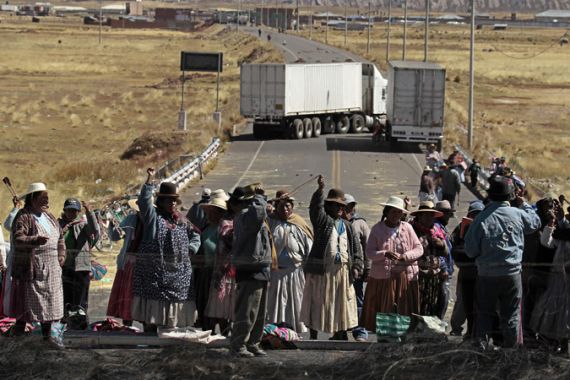Demonstrators paralyse Peruvian border town
Property damaged by frustrated protesters after weeks of non-violent actions to stop a new foreign mine near Bolivia.

Demonstrators attempting to stop a transnational mining company from extracting silver posits from Peru have intensified their tactics after three weeks of non-violent protests, damaging government and private property in the Andean border region near Bolivia.
For weeks, a group of about 10,000 protesters blockaded streets in the country’s southeast in an effort to convince Peru’s government to revoke the license already given to Bear Creek Mining Corp, a Canadian company planning to mine silver in the area.
Keep reading
list of 4 itemsParallel economy: How Russia is defying the West’s boycott
US House approves aid package worth billions for Ukraine, Israel
Ecuador weighs security, international arbitration in latest referendum
Road blockades made from rocks blocked about 300km on both sides of the border road from Peru to Bolivia, and activists manned road blocks every few kilometres, to ensure nothing could get through.
Paolo Castro, a local farmer and protester, told Al Jazeera that she is upset because “the president has sold off our territory without consulting us”.
“We know that in European countries, for example, mining contaminates a lot, so that’s why they want to send the mines to underdeveloped countries,” Alejandro Tucuuhami, another farmer, said.
Amid frustration with the protests’ lack of success, some demonstrators began breaking into government buildings on Friday.
The tax office in Puno, a Peru border town, was raided and files and furniture pulled to the street and set ablaze, and several windows were smashed at private and public buildings, banks and cars.
No police
Police were absent from the scene, and according to a police officer who spoke on condition of anonymity, a retreat order came directly from Lima, Peru’s capital.
Private and public businesses, from schools to food markets closed down to avoid protests, while activists set fire to a customs warehouse, which had held at least 20 cars. Firefighters were unwilling to extinguish the blaze without police to protect them.
Erland Melgar, vice president of Bolivia’s trucking association, told reporters that due to the blockades, about 600 trucks, many carrying food exports to Peruvian ports, were stranded on the Bolivian side of the border and about 180 on the Peruvian side.
Oswaldo Torrez, a Bolivian congressperson told Al Jazeera, “what’s worrying us is that some of the truck drivers are hunting fish and wild ducks”.
The protesters are now threatening a boycott of the June 5 presidential run-off election.
Walter Aduviri, a protest leader, said that if mining and oil exploration are not halted in Puno there will be no voting in the region.
“I didn’t make the decision, the people did,” he said.
The vote boycott could hurt the election bid of former army officer Ollanta Humala, the leading leftist candidate who has had major support from Puno.
Humala says that if elected he would seek to make mining companies pay higher royalties and make natural gas cheaper for Peruvians.
The alternative, Keiko Fujimori, the daughter of imprisoned former president Alberto Fujimori, supports the status quo, which allowed the Bear Creek contract and has been favourable to mining investors.
Massive mining growth
Peru government officials said that it would be unconstitutional to meet the protesters’ demand and cancel mineral concessions.
Bear Creek Mining Corp says that it already invested $25m in the contested mine, and hopes that it will begin production next year.
Protesters fear that the company will pollute the water in its effort to separate silver, and an environmental impact statement is under government review.
The company’s director, Andrew Swarthout, said that the mine would have no impact on Lake Titicaca, South America’s largest lake, and that the project would provide about 1,000 local jobs.
But protesters, mostly indigenous Aymaras who populate most of the Andes region, are not happy with the plans.
Companies have pledged more than $40bn in investments in Peru’s mining sector in the coming decade. Peru is a top exporter of gold, silver and copper, and mining accounts for 68 per cent of its export revenues.
Bear Creek’s Swarthout said, “There are many companies watching this situation. If we run into serious problems and are not able to complete our investment on this project or another couple of projects that we’re looking at, other companies are going to take pause as well.”
Epifanio Baca, an economist at the Center for the Study and Promotion of Development, said the Puno unrest is the latest expression of growing discontent with a government that “has continued to grant mining concessions automatically, without any consideration for the opinions of local authorities or communities.”
Last month, the government suspended the Tia Maria copper mining project in neighbouring Arequipa province after three protesters died in clashes with police.